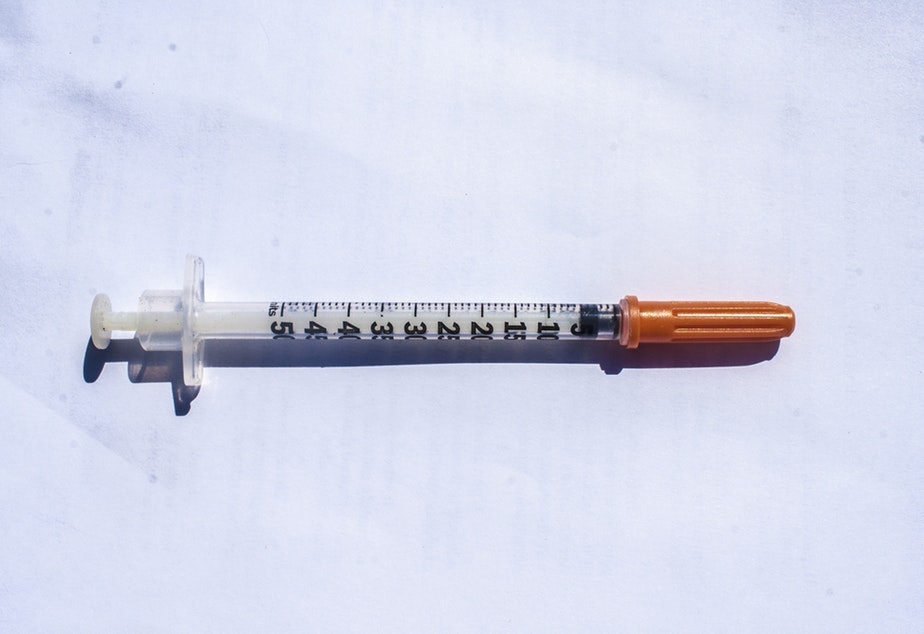Local community feels the impact of HIV cases in North Seattle

It’s mid-week at the Aurora Commons in North Seattle and staff are shepherding their clients — most of them homeless — out of the service space that's about to close.
People dawdle, loathed to face the chill outside. Women who are signed up for a weekly clinic are allowed to remain a little longer as they await their turn to go inside the big mobile health center parked outside.
Over the past few weeks, this health clinic, known as the SHE clinic, has diagnosed several people with HIV, and had others referred for treatment.
The number of new HIV cases among people who are homeless in North Seattle has continued to rise in recent weeks. Public health officials say there are now 14 confirmed cases in a cluster that's causing serious concern.
"Without addressing the homelessness and without addressing the lack of access to care in that area, we're not going to be able to get this under control," said Dr. Shireesha Dhanireddy. She helps run the SHE clinic.
Dhanireddy said they may see more cases if underlying issues like the need for opioid addiction treatment aren't met. She said there’s also a need for education among the population most at risk.
"There's such a disconnect between their risk and their perception of risk," she said.
Sponsored
Those who have tested positive so far are homeless in North Seattle. Many inject drugs, several are sex workers.
This is the largest uptick in new cases among heterosexuals in many years, according to public health officials. They say they're very concerned because this shows HIV is spreading in a new, and vulnerable community. And it’s having an impact in that community.
Lisa visits the clinic outside the Aurora Commons regularly. She’s a sex worker and she said it's been scary to see some of her friends test positive.
"I had to actually think, like, what am I going to do if she tells me today I'm HIV positive? I still have to get my rent,” she said. “I was literally processing it like what if she tells me right now that I'm HIV positive. This is a possibility, you know."
Lisa has been tested at the SHE clinic a couple of times now and she’s tested negative. She’s now taking PrEP, a medication that can help reduce the risk of getting HIV. SHE clinic and Aurora Commons staff say this is a new trend.
Sponsored
"We have people asking all the time about talking to the clinic, about getting on PrEP and telling their friends, and yeah, it's super exciting," said Katie Ross, a staff member at the Commons. Ross said the heightened interest in prevention and the swift reaction from public health — working to get additional outreach, testing and needle exchanges to the area — have been an upside.
But she said it's difficult to see some of their clients who test positive not following up with treatment.
"It's not as easy as just getting on treatment, taking the meds. You know, it's kind of complicated for our folks. So it can be hard watching folks," she said.
In the broader North Seattle community, the uptick has some people talking about the need for stricter enforcement around drug use. Neighbor Jennifer Coats said she's concerned about the potential danger discarded needles pose.
"With the used needles, they're in playgrounds, they're on streets, they're in public areas, they're in private areas. I mean, we find them on our property. And if you're not paying attention you could step on an infected needle," Coats said.
Sponsored
Kevin Whatley is with a neighborhood group that advocates to make the Aurora Licton Springs area more walkable and appealing. He said people don't need to be alarmed.
"You know, rather than us be fearful of it and avoid it, let's just embrace the idea of how do we deal with it as a community. And how do we deal with it as a community is having safe and proper resources to either call and report it or even having proper training just to remove it ourselves," Whatley said.
Whatley said there's already been one training for businesses on how to dispose of needles safely, and there may be more. But if neighbors don't feel safe, or don't feel it's their job to pick up needles, Whatley said they can report them to a city hotline or use the Find It, Fix It app.
Public health officials say they’re focused on responding to the uptick in HIV cases in the homeless community in North Seattle. They say stopping the spread of HIV in this community will take new resources and long-term, sustained work.

